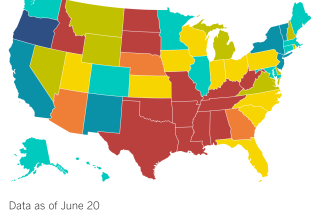Smoking bans may not be embraced in South, but they’re no stranger either
- Share via
No-smoking rules will be everywhere by 2020, predicts the Centers for Disease Control and Prevention, if the rate of new laws banning smoking in restaurants, bars and private worksites continues.
Already, 25 states and the District of Columbia have bans in those locations, up from zero states in 2000. So in the next 10 years, the other half of the country seems likely to join them. But maybe not the South.
The CDC writes in its Morbidity and Mortality Weekly Report:
“Regional disparities remain in policy adoption, with no southern state having adopted a smoke-free law that prohibits smoking in all three venues.”
Some Southern states are close—Florida and Louisiana have restrictions in worksites and restaurants but not bars. And North Carolina has bans in restaurants and bars but not worksites.
But other states (most of them in the South) may be more reluctant to put out the cigarettes. Seven have no statewide restrictions at all: Indiana, Kentucky, Mississippi, South Carolina, Texas, West Virginia and Wyoming.
Delaware was the first to pass comprehensive smoke-free laws in 2002, followed by New York, Massachusetts, Rhode Island and Washington.
In some states—California (which enacted state restrictions in 1994) and Connecticut—the areas in which smoking is permitted must be ventilated.
The CDC states why it cares about such laws:
“Secondhand smoke (SHS) exposure causes lung cancer and cardiovascular and respiratory diseases in nonsmoking adults and children, resulting in an estimated 46,000 heart disease deaths and 3,400 lung cancer deaths among U.S. nonsmoking adults each year.”
The agency seems hopeful that Southern states will warm to the cause of blowing secondhand smoke out of enclosed places, at least bit by bit. It notes:
“While no southern states have a comprehensive smoke-free law in effect, many communities in these states have adopted comprehensive local smoke-free laws.”
And therein lies the hope – at least by public health experts – that the South will get on board the protect-everyone’s-health train.
Traditionally, the South has been proudly resistant when it comes to getting on board any other area’s train or bandwagon, but some residents share the hope that this will be an exception.
A particularly barbed post from the Greensboro, N.C., News and Record seems to frame the evolving views nicely. It begins: “Some people still believe the new smoking ban on bars and restaurants in North Carolina is too restrictive. I don’t believe it’s restrictive enough.”
The writer, Allen Johnson, then recounts an outdoor dining experience marred by cigarette smoke, there being no smoking ban in outdoor dining areas. He then suggests that such bans could help revive the downtown area and adds … well, let’s give him the stage:
“In South Carolina, there is no statewide smoking ban, but a number of municipalities have enacted their own regulations.
Greenville is one.
Greenville already has set a stellar example on how to revive a downtown.
Since when did we have to look to South Carolina for progressive ideas?”






